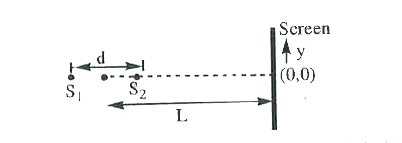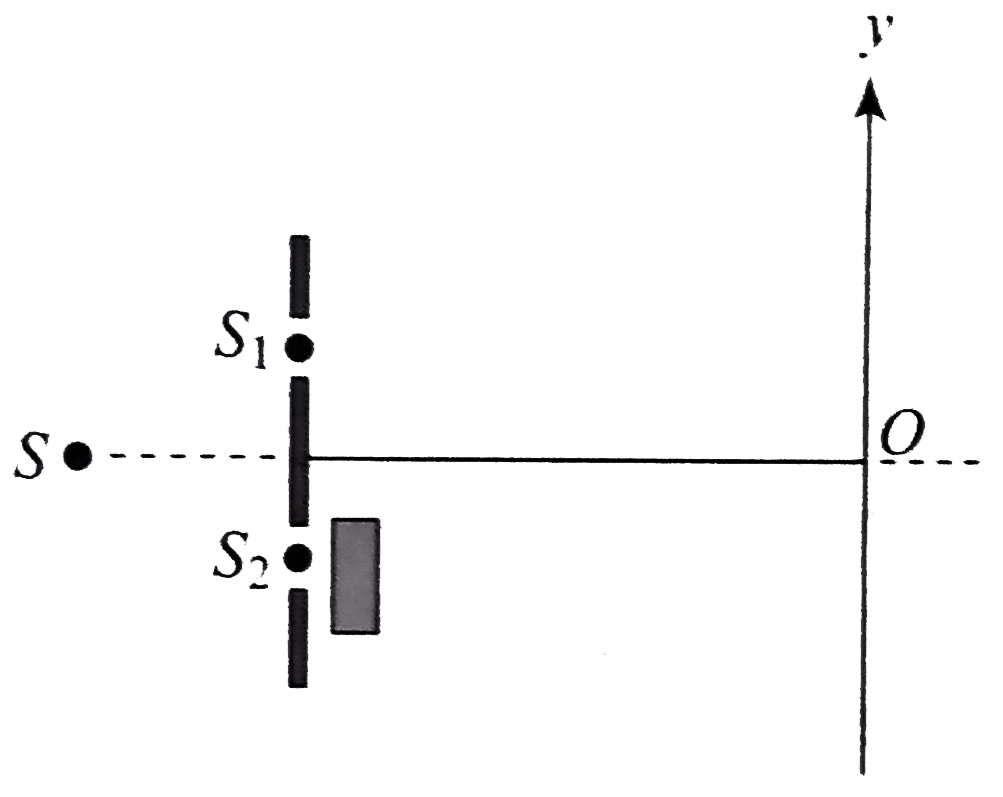A double slit experiment is performed with light of wavelength 500 nm. A thin film of thickness 2μm and refractive index 1.5 is introduced in the path of the upper beam. The location of the central maximum willSolution in Telugu
remain unshifted
shift downward bu nearly two fringes
shift upward by nearly two fringes
shift downward by 10 fringes
The correct Answer is:C
Step by step video, text & image solution for A double slit experiment is performed with light of wavelength 500 nm. A thin film of thickness 2mu m and refractive index 1.5 is introduced in the path of the upper beam. The location of the central maximum will by Physics experts to help you in doubts & scoring excellent marks in Class 12 exams.
Updated on:21/07/2023Topper's Solved these Questions
- WAVE OPTICSBOOK - AAKASH SERIESCHAPTER - WAVE OPTICSEXERCISE - PRACTICE SHEET EXERCISE -I (LEVEL II - ADVANCED)(Straight Objective Type Questions)
9 Videos
- WAVE OPTICSBOOK - AAKASH SERIESCHAPTER - WAVE OPTICSEXERCISE - PRACTICE SHEET EXERCISE -I (LEVEL II - ADVANCED)(More than one correct answer Type Questions)
2 Videos
- WAVE OPTICSBOOK - AAKASH SERIESCHAPTER - WAVE OPTICSEXERCISE - LECTURE SHEET EXERCISE-III (LEVEL -II) (MAIN) (Straight Objective Type Questions)
8 Videos
- WAVE MOTION AND SOUNDBOOK - AAKASH SERIESCHAPTER - WAVE MOTION AND SOUNDEXERCISE - PROBLEMS (LEVEL - II)
81 Videos
- WAVESBOOK - AAKASH SERIESCHAPTER - WAVESEXERCISE - EXERCISE-III (Doppler effect :)
15 Videos
Similar Questions
A beam of light consisting of two wavelength , 6500A∘ and 5200A∘ is used to obtain interference fringes in a Young's double slit experiment (1Å=10−10m). The distance between the slits 2.0 mm and the distance between the plane of the slits and the screen is 120 cm. Find the distance of the third bright fringe on the screen from the central maximum for the wavelength 6500Å.
View SolutionThe figure shows two points source which emit light of wavelength λ in phase with each other and are at a distance d=5.5λ apart along a line which is perpendicular to a large screen at a distance L from the centre of the source. Assume that d is much less than L. Which of the following statement is (are) correct ?

View SolutionUnpolarised light of intensity 32 Wm−2 passes through three polarisers such that the transmission axis of the last polariser s crossed with first . If the intensity of the emerging light is 32Wm−2 , the angle between the axes of the first two polarisers is
View SolutionA wave is described by the equation
y=(1.0mm)sinπ(x2.0cm−10.01s)
Find the time period and the wavelength.
View SolutionWhen a train is approaching the stationary observer, the apparent frequency of the whistle observed as 100 Hz, while when it has passed away from the observer with same speed, it is 50 Hz. Calculate the frequency of the whistle when the observer moves with the train (V = 330 m/s)
View SolutionA YDSE is performed in a medium of refractive index 4/3, A light of 600 nm wavelength is falling on the slits having 0.45 nm separation . The lower slit S2 is covered b a thin glass plate of thickness 10.4 mm and refractive index 1.5. The interference pattern is observed on a screen placed 1.5 m from the slits as shown in figure. (All the wavelengths in this problem are for the given medium of refractive index 4/3, ignore absorption.)

The location of the central maximum (bright fringe with zero path difference) on the y-axis will be
View SolutionIn the ideal double-slit experiment, when a glass-plate (refractive index 1.5) of thickness t is introduced in the path of one of the interfering beams (wavelength lambda ), the intensity at the position where the central maximum occurred previously remains unchanged. The minimum thickness of the glass-plate is
View SolutionA thin sheet of glass (refractive index 1.5) of thickness 6 microns, introduced in the path of one of the interfering beams in a double-slit experiment shift the central fringe to a position earlier occupied by the fifth bright fringe. The wavelength of light used is
View SolutionOn introducing a thin film in the path of one of the two interfering beam, the central fringe will shift by one fringe width. If μ=1.5, the thickness of the film is (wavelength of monochromatic light is λ)
View SolutionA thin mica sheet of thickness 4×10−6 m and refractive index (μ=1.5) is introduced in the path of the light from upper slit. The wavelength of the wave used is 5000Å The central bright maximum will shift
View SolutionIn Young's double slit experiment the two slits are illuminated with light of wavelength λ .The thickness of a film of refractive index 1.4 to be introduced in the path of one of the interfering beams so that the central image shifts by one fringe width is
View SolutionThe central fringe shifts to the position of fifth bright fringe, if a thin film of refractive index 1.5 is introduced in the path of light of wavelength 5000Å. The thickness of the glass plate is
View SolutionYoung's double slit experiment is performed with monochromatic light. A thin film is introduced in front of one of the slits
View SolutionOn introducing a thin film in the path of one of the two interfering beam, the central fringe will shift by one fringe width if μ=1.5, the thickness of the film is (wavelength of monochromatic light is λ)
View Solutionएक 500 nm तरंगदैर्ध्य वाले प्रकाश पर द्वि-स्लिट प्रयोग किया जाता है। जब एक 2μn मोटाई की तथा अपवर्तक सूचकांक 1.5 की एक पतली फिल्म ऊपरी बीमा के पथ पर आपतित होती है, तब केन्द्रीय उच्चिष्ठ की स्थिति
View SolutionA thin film of a material of refractive index 1.38 is coated on a glass surface of refractive index 1.5.Light of wavelength 550 nm gives no reflected light. The minimum thickness of the film is :
View Solution
